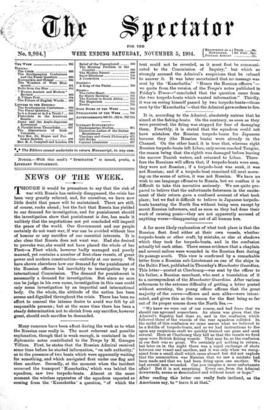T HOUGH it would be premature to say that the risk
of war with Russia has entirely disappeared, the crisis has been very greatly relieved, and, for ourselves, we have now little doubt that peace will be maintained. There are still, of course, rocks ahead ; but the fact that Russia has yielded to our demand for investigation, and for punishment should the investigation show that punishment is due, has made it unlikely that the negotiations not yet concluded will imperil the peace of the world. Our Government and our people certainly do not want war, if war can be avoided without loss of honour or any sacrifice of our essential interests. It is also clear that Russia does not want war. Had she desired to provoke war, she would not have placed the whole of her Fleet—a Fleet which, however badly managed and poorly manned, yet contains a number of first-class vessels, of great power and modern construction—entirely at our mercy. We have shown elsewhere how our demand for the punishment of the Russian officers led inevitably to investigation by an international Commission. The demand for punishment is necessarily a demand for investigation. But since no man can be judge in his own cause, investigation in this case could only mean investigation by an impartial and international body. On the whole, the attitude of the nation has been serene and dignified throughout the crisis. There has been no effort to conceal the intense desire to avoid war felt by all responsible persons ; but at the same time there has been a steady determination not to shrink from any sacrifice, however great, should such sacrifice be demanded.


























































 Previous page
Previous page